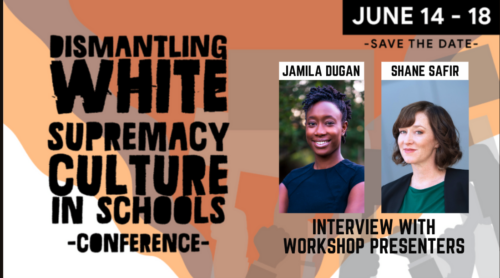How Do We Dismantle White Supremacy Culture? – Shane Safir & Jamila Dugan, Presenter at DWSC 2021 – DWSC Conference Presenter Spotlight
Find out how we dismantle white supremacy culture from Shane Safir & Jamila Dugan, authors of Street Data.
Jamila and Shane are 2 of our wonderful workshop presenters at the upcoming Dismantling White Supremacy Culture in Schools 2021 Conference. June 14-18th. Read all the other presenter interviews here: Matthew Kay.
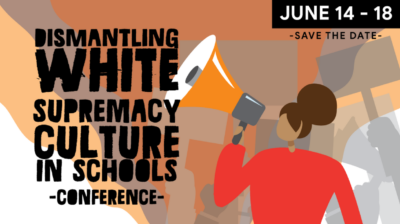
Register for the DismantleWSC Conference here and learn about our presenters below.
Interview with Shane Safir & Jamila Dugan
What type of student were you and where did you find joy?
SS: I was a “good student” dealing with a lot of trauma in my home. I internalized the trauma and externalized “success” as a way to feel some control in the chaos, which is partly why I believe external measures of success are flimsy at best. They don’t account for the holistic student experience, including the complexity of identity, belonging, and social-emotional learning vs just academics. I can’t say high school was a time of joy for me, to be real, as I was dealing with family drama and feeling alienated for being LGBTQ. But I did love and enjoy my baby sister (now 33!) who was born when I was in 9th grade. I have also always loved learning in the sense of critical thinking, talking about ideas, etc. I enjoyed debate and drama probably more than any other content.
JD: My educational experience was an interesting one. If you ask about my early and middle school years, I have fond memories. I can recall fun projects, many loving teachers, and great friends. I had no idea that we were being tracked at that time though. In high school however, I failed out in 10th grade. 72 absences and a steady 1.3 grade average in the 10th grade. Suddenly, I found myself in classes with none of my friends (who were largely Black) and in classes covering content that had little interest to me. My home life was a mess and in school support was non-existent. I am thankful that my father sent me to a Pan-Afrikan after that, I fell in love with the process of critically examining things like Cointelpro, learning the principles of Maat, and developing our own small businesses to learn cooperative economics. Loved it!
What is the most destructive force in schools?
SS: I think the most destructive force in schools right now is the incarceration of our imaginations, which is rooted in the history of systemic racism and white supremacy. We have built and inherited this oppressive educational system that values compliance, hierarchy, linear thinking, lecture-style pedagogy, and all the trappings of Western epistemology. Within that construct, we sometimes forget that we have the right to joy, connection, creativity, and healing. We have a right to build beloved, thriving communities that honor the inherent worth and dignity of every child and adult. This longing for another way was a big motivator for Street Data.
JD: I agree with Shane, we have a real issue with imagination. This is across the board and is extremely harmful especially to students with learning differences and Black, Indeginous and other students of color. The lack of imagination hinders the genius of kids and lends itself to painfully low expectations, one size fits all approaches, and schooling experiences designed based on white supremacist views of success. The everyday discourse, practices, and narratives that are about what “we” can’t do, which is really anyone who is not white conforming and middle to upper class have destroyed the spirits of many.
As we return back to in-person learning, what should we prioritize?
SS: Great question! I say healing first. My coauthor Jamila Dugan recently found this tweet where students were asked how schools should respond to the idea of “lost” learning. They said, “Help us heal.” The idea of diving back into testing and standardized curriculum after what we’ve been through collectively makes my stomach churn. We need to start the year with opportunities to heal and connect, first and foremost, through community circles, art projects, reflective writing, autobiography, and oral history. I would propose that for at least the first month of school, we focus purely on the “content” of surviving a quadruple pandemic. How has the global health crisis impacted you and your community? What have you learned about virus transmission and what it means to live as an interdependent community? How has the movement for racial justice impacted and shaped your thinking about the world? How is climate change transforming the place where you live, and how would you design a policy agenda to slow its progression?
JD: In our book “Steet Data,” one of the arguments Shane makes is that we need to “Choose the Margins” – meaning listen to those who’ve been marginalized in your context and in general. I’d argue that we need to start by redesigning the entire school experience and doing so in collaboration with those at the margins especially Black students. Students have ideas about how they want to experience learning. Going forward I’d ask us to choose the margins and prioritize imagination and the co-designing process with students. And for the life of me, do not use standardized test data from 2019 or this year if it is being taken still to guide any of it.
When it gets hard, where do you find inspiration to continue fighting for justice?
SS: The babies, always the babies. Whether it’s my own children finding their humanity and identities in complex times or watching young organizers and activists change the national conversation, I am inspired by how young people call on us to be better and do better. They won’t settle for “good enough.” They will freedom-dream and call us in to a new world if we are brave enough to listen to them.
JD: Black and #edutwitter are lit! Sometimes I get tired and I’ll catch a tweet like the series I just saw from Chris Emdin around imagination. That can be inspiring on the day to day. To take it higher level though, I am inspired by the cascade of brilliance I am seeing from scholars like Gholdy Muhammad, students, and my children that provide me with a constant reminder of my “why.” Not to mention my elders and ancestors. If Ida B. Wells or Maya Angelou could stand tall so shall I.
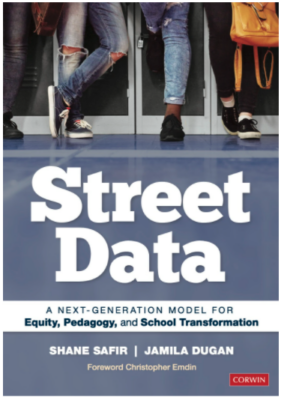
What is the most exciting aspect of your work?
SS: Right now, I am deeply inspired by being asked to sit in policy conversation with folks like Partnership for the Future of Learning and Learning Policy Institute to try to reimagine the system we have been locked in for the last two decades. It makes me hopeful that we can seek radical transformation and not just incremental improvement. With Street Data, Jamila and I hope to issue a call to action to not just talk about equity and antiracist approaches, but to completely change the way we think about and engage in schooling.
I also love working directly with school leaders and teachers on the ground because, as we reflect in the book, equity work is first and foremost pedagogical. If we don’t drive our antiracist efforts into the classroom–and into what children experience, live, and breathe every single day–we are doing the work performatively and not transformatively.
JD: Two things come up for me. One, writing has become very exciting. I am so inspired by the
Genius of my people and to write about all of the possibility that comes with freedom and liberation is powerful for me. It’s exciting to be standing on the shoulders of so many. Two, working with leaders and their staff. It’s those one on one conversations or an observation of a meeting where I see the magic happen. I love watching the domino effect or having a tough conversation that leads to change in service of our students. It’s the closest feeling I can get to being in the classroom. I am really energized by that.
What is your favorite book, song or movie of all time? Why?
SS: Damn! I can’t answer that. Too much pressure, lol, so I’ll just share one. I think Moonlight was one of the most profound and touching films ever made. Visually, it was stunning. But more than that, the textured portrayal of a Black gay man’s lived experience brought the idea of intersectionality to life in the most powerful and humanizing way. I absolutely loved that movie. One of my favorite books is Being Mortal: Medicine and What Matters in the End by physician and writer A’tul Gawande. It is so poignant and offers a radical reframe of the process through which our lives draw to a close. As I think about it, he’s deconstructing the epistemology of Western medicine in much the same ways Jamila and I try to deconstruct the epistemology of Western education in Street Data. Check it out!
JD: That question is a rabbit hole for me! I am a total music head. Today, my song might be “Starship” by Norman Conners tomorrow it might be “C.R.E.A.M” by Wutang. Next week, it could be “Slow Down” by Skip Marly and H.E.R and the following week “Sweetest Taboo” by Sade. I might throw in a little old school Kanye, Jodeci, Outkast, or the Bay Areas own Mac Dre on another day. And then we have Stevie and Lutha (Luther Vandross)! I could go on and on. I have playlists for days! There’s a framed picture on my wall that says “Without music, life would not be fair.” Music is universal and can take you through every emotion; bring you up, and comfort you when you are down. I need that as an educator.
Register for the DismantleWSC Conference here!

About Shane and Jamila
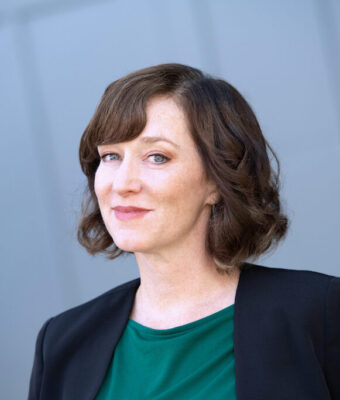
Shane Safir has worked at every level of the education system, from the classroom to the boardroom, for 25 years. In 2003, after teaching in San Francisco and Oakland and organizing with the San Francisco Organizing Project to launch a new school, Safir became the founding principal of June Jordan School for Equity (JJSE), an innovative national model identified by leading scholar Linda Darling-Hammond as having “beaten the odds in supporting the success of low-income students of color.” Since 2008, Safir has provided equity-centered leadership coaching, strategic planning, and professional learning support for schools, districts, and organizations across the U.S. and Canada. She facilitates sought-after workshops on creating brave spaces for equity, listening leadership, coaching, and adult learning among other areas. She writes frequently for Edutopia and ASCD’s Educational Leadership magazine and is the author of The Listening Leader: Creating the Conditions for Equitable School Transformation (Jossey-Bass: 2017). Shane’s latest book, coauthored with Dr. Jamila Dugan, and Street Data: A Next-Generation Model for Equity, Pedagogy, and School Transformation, (Corwin, 2021). To learn more, visit www.shanesafir.com.
https://us.corwin.com/en-us/nam/street-data/book271852
https://www.amazon.com/Street-Data-Next-Generation-Pedagogy-Transformation/dp/1071812718
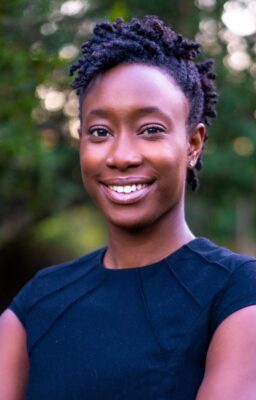 Jamila Dugan is a leadership coach, learning facilitator, and researcher. She began her career as a teacher in Washington D.C., successfully supporting her school to implement an International Baccalaureate program. After being nominated for Teacher of the Year, she later served as a coach for new teachers in Oakland, California. As a school administrator, Jamila championed equity-centered student services, parent empowerment, and co-led the development of the first public Mandarin immersion middle school in the Bay Area. She was the lead researcher for Shane Safir’s, The Listening Leader and is the co-author of Street Data: A Next Generation Model for Equity, Pedagogy, and School Transformation with Shane. She currently serves as an equity-centered leadership development coach across all sectors including non-profits, public school districts, charter networks, parochial, and private schools. Jamila is also a loving wife and the mother of three amazing children who remain the constant inspiration for her work.
Jamila Dugan is a leadership coach, learning facilitator, and researcher. She began her career as a teacher in Washington D.C., successfully supporting her school to implement an International Baccalaureate program. After being nominated for Teacher of the Year, she later served as a coach for new teachers in Oakland, California. As a school administrator, Jamila championed equity-centered student services, parent empowerment, and co-led the development of the first public Mandarin immersion middle school in the Bay Area. She was the lead researcher for Shane Safir’s, The Listening Leader and is the co-author of Street Data: A Next Generation Model for Equity, Pedagogy, and School Transformation with Shane. She currently serves as an equity-centered leadership development coach across all sectors including non-profits, public school districts, charter networks, parochial, and private schools. Jamila is also a loving wife and the mother of three amazing children who remain the constant inspiration for her work.
To learn more, visit www.jamiladugan.com

